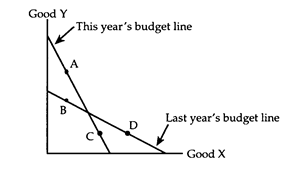Tariff accounts for 32% of the total government revenue in the U.K. and only 1.2% in India
a. True
b. False
Indicate whether the statement is true or false
False
You might also like to view...
In order to identify differences in preferences among various countries, one would look for evidence that

a. indifference curves from different countries cross.
b. prices for goods differ among countries.
c. different market baskets are chosen among different nationalities.
d. higher income countries choose baskets with more of all goods.
Price floors set a legal minimum price on a product or commodity
a. True b. False Indicate whether the statement is true or false
Which of the following is most likely to result in a decline in the economic growth of a nation?
a. The installation of a network of irrigation ditches and pumping stations to grow fruits and vegetables in parts of southern California b. The invention of a threshing machine for harvesting grains c. Increased government funding for higher-secondary education d. Emigration by the citizens of Nomanzia, an island country, when a politically repressive regime took office
Macroeconomics differs from microeconomics in that:
A. macroeconomics is the study of individual markets, while microeconomics deals with the nation's economy as a whole. B. microeconomics is the study of individual markets, while macroeconomics deals with the nation's economy as a whole. C. macroeconomics focuses principally on social and political issues, while microeconomics involves the study of a nation's monetary system. D. microeconomics focuses principally on social and political issues, while macroeconomics involves the study of a nation's monetary system.